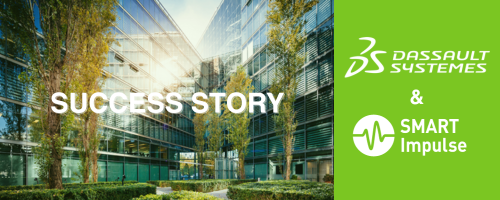
Dassault Systèmes & Smart Impulse: From Energy Optimisation to ISO 50 001
In an increasingly conscious world regarding the importance of sustainability and energy consumption reduction, companies are actively seeking ways for energy optimisation. Dassault Systèmes, a global leader in 3D software and product lifecycle management, has taken ambitious steps to implement energy monitoring across its international real estate portfolio with the aim of identifying and tracking energy savings. Their initiative has resulted in the attainment of ISO 50001 certification, a notable milestone in their commitment to sustainable development. This article traces the success story of Dassault Systèmes and highlights the contribution of Smart Impulse.

Dassault Systèmes’ challenge
Dassault Systèmes (3DS) is a renowned company operating in the cutting-edge technology sector. With an international real estate portfolio consisting of numerous heterogeneous sites, it was imperative for the company to monitor its energy consumption accurately and efficiently. The initial challenge was to implement energy monitoring across a scope of 33 sites in Europe, including a headquarters covering an area of 69,200 square meters, and 11 sites in the Americas totaling 51,600 square meters, in order to target and track energy savings in accordance with ISO 50001 standards. Additionally, the automation of CSR reporting was a key objective for Dassault Systèmes.
The Energy Optimisation Approach by Smart Impulse
Faced with this significant challenge, Dassault Systèmes partnered with Smart Impulse to measure and monitor its electrical consumption by usage. Smart Impulse’s approach involved deploying the Smart X solution across 3DS sites, tailored to the size and occupancy of each site. For single-occupancy sites, a Smart X was installed per low-voltage main distribution board (TGBT) to measure the entire site’s consumption. For multi-occupancy sites, a Smart X was deployed per floor occupied by Dassault Systèmes. Additionally, an additional Smart X was used to specifically monitor company restaurants and data centers, areas with high energy consumption.
The installation of Smart X devices proved to be quick and non-intrusive, carried out either by a Smart Impulse partner electrician or the site’s electrician. Once in place, these devices facilitated the accurate breakdown of energy consumption by usage, providing Dassault Systèmes with a detailed insight into how electricity was being utilised at each site.
An essential aspect of Smart Impulse’s approach was the step-by-step guidance provided by dedicated experts in 5 languages. This allowed Dassault Systèmes to gain a deep understanding of electrical consumption data and make the most of its use for each site. Additionally, Smart Monitoring tracking tools, such as the SaaS platform, featuring informative dashboards and alerts, were made available to the company to monitor and effectively manage electricity consumption.
Benefits for Dassault Systèmes
The implementation of the Smart Impulse solution brought numerous advantages to Dassault Systèmes. Firstly, Dassault Systèmes was able to target and track energy optimisation actions on a site-by-site basis and at a global level. The data provided by the Smart X solution was crucial in identifying areas where energy savings were possible while maintaining comfort and operational needs. The Smart Impulse solution allowed the real estate management to monitor and coordinate these initiatives in collaboration with local stakeholders, meaning site teams or operators.
The company also automated its CSR reporting through the interoperability of Smart Impulse tools, allowing for the automatic integration of electrical consumption data into the energy and real estate information system of 3DS. This enabled the company to generate reports based on reliable data more quickly, concerning their energy impact.
Dassault Systèmes also focused its efforts on optimising IT processes in collaboration with the Information Systems Department (ISD). Energy data served as the foundation for fruitful discussions aimed at reducing energy consumption related to IT systems and data centers.
Furthermore, the energy data initiated a dialogue with landlords, fostering constructive discussions on consumption deviations. These discussions led to measures to reduce energy consumption and improve energy efficiency.
The attainment of ISO 50001 certification for the equipped sites was a major milestone for Dassault Systèmes, attesting to their commitment to effective energy management. This certification serves as an official recognition of their sustainable development initiatives.
Indeed, ISO 50 001 is an international standard that assists organisations in establishing an efficient energy management system to optimise their energy use and reduce their carbon footprint.
The Smart Impulse solutions addressed the following challenges of the standard:
- Analysis of Usage and Energy Consumption
- Identification of Significant Energy Uses
- Identification and Improvement of Energy Performance
- Measurement, Monitoring, and Analysis of Implemented Actions
- Guarantee of Reliable and Repeatable Data
In 2021, ISO 50001 certification was obtained for all 39 equipped sites, demonstrating Dassault Systèmes’ compliance with international standards in energy management.
Concrete Results of Energy Optimisation
The tangible results of this initiative are impressive. For instance, on the 3DS campus between September and December 2022, significant energy savings were achieved, with a 27% reduction in heating consumption and a 29% reduction in lighting consumption. These figures speak for themselves and illustrate how the Smart Impulse solution has already proven to be cost-effective in a remarkably short period.

Conclusion
Dassault Systèmes’ success story in implementing an energy management system across its international real estate portfolio serves as a concrete example of the positive impact of deploying Smart Impulse solutions. Through this initiative, Dassault Systèmes achieved ISO 50001 certification, reduced its energy consumption, improved CSR reporting, and initiated constructive dialogues with landlords. The significant energy savings achieved in a short period underscore the effectiveness of this approach.
To go further, read our last article:


